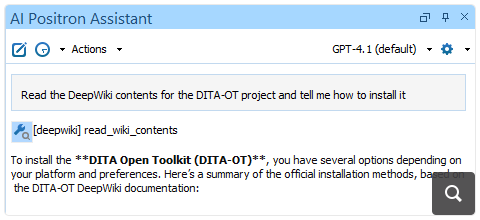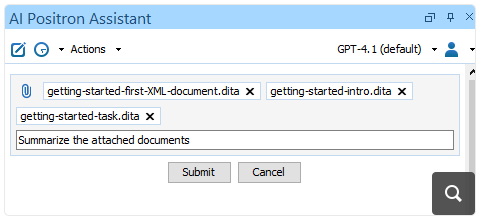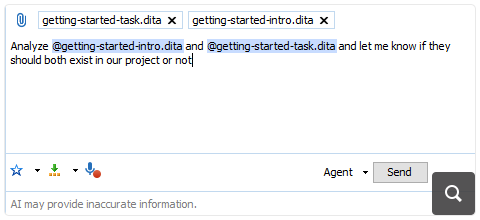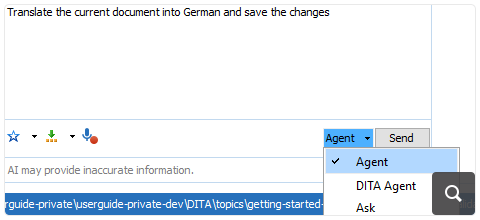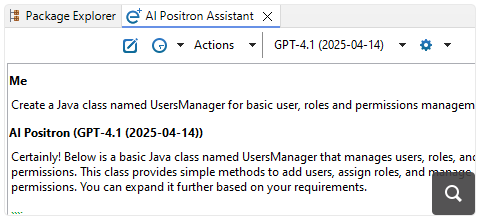Oxygen AI Positron for Eclipse 8.1
Version 8.1 of
Oxygen AI Positron Assistant for Eclipse brings the latest AI-powered
authoring enhancements to users of Oxygen XML tools within the Eclipse environment. This
release includes support for OpenAI GPT-5.2 models, enhanced context awareness, and smarter
handling of document attachments further boost productivity.
OpenAI GPT-5.2 Models Available
The flagship GPT-5.2 and GPT-5.2 Thinking models are now available in the list
of OpenAI models to choose from.
Optimized Token Consumption for AI Prompts and Tools
The prompts and tools that the AI uses to generate answers have been improved
to consume fewer tokens/credits.
More Context Information Available in Chat
The AI chat now automatically includes additional information about your environment
and editing context, such as the Oxygen application version, operating system details,
current date, and caret or selection data (Oxygen 28.1 or newer). Having richer
contextual information leads to higher-quality AI responses.
Control AI Action Visibility
You can now choose whether a defined AI action is visible in the UI or only
available to other AI actions as a sub-agent by using the new
visibility
property. For more details, see
AI Positron User Guide: Visibility Property.
Create AI Actions with Vision Support
You can now decide whether a custom AI action sends both content and referenced
images to the LLM by using the "input-type":
"markup-with-images" JSON
property. This helps you include images only when they are relevant for the AI
response.
Generate Image Alternate Text Improvements
The Generate Image Alternate Text action can now be used on
all images that are referenced within a document at once, while you can still use the
action on individual selections as well.
Preserve
Structure and Styles for Attached Word and PDF Documents
When attaching Word (.docx) or PDF documents in the chat, their internal
structure (headings, lists, tables, code blocks) and styling (bold, italic) are now
preserved when being sent to the AI so that it better understands the context of the
document.
Oxygen AI Positron for Eclipse 8.0
Oxygen AI Positron 8.0 for the Eclipse distribution adds a dedicated
AWS Bedrock connector and new AI model options (OpenAI GPT-5.1, Claude Sonnet 4.5, Claude
Haiku 4.5, and xAI Grok 4 Fast) allowing you to choose the right balance between quality and
speed for your tasks.
Development moves faster with smarter, project-specific prompts and the AI can now make
targeted changes with the edit_document tool.
New Dedicated Connector: AWS Bedrock
You can now connect AI Positron to the AWS Bedrock service
using a dedicated connector. Get instant access to enterprise-grade AI models with simple
API key authentication, real-time streaming responses, and multi-modal
capabilities.
Smarter AI Context Prompt Setup
You can now use the Generate agent instructions action to
create a project-specific context prompt. This prompt helps the AI understand the
structure and conventions of your project, so that AI-generated content matches your
project’s specific organization, framework, and metadata requirements. The generated
prompt is saved as a Markdown file in your project and is used by AI Positron when you use
chat or other AI actions.
Edit Document Tool
When using agentic chat to make changes to topics, small changes (e.g.
attribute values, spelling corrections) can now be made more easily by the AI engine using
the newly available edit_document tool that performs exact string
replacements in a specified file.
Generate Code Improvements (Oxygen 28.0 Required)
The Generate Code development AI action now provides the
structure of the associated XML file in the prompt, ensuring better results. For XSLT and
XQuery, it includes the structure of the XML document associated in the transformation
scenario, while for schemas (XSD, Schematron, DTD, RNG, RNC), it includes the structure of
an instance that has the schema associated in a validation scenario.
OpenAI GPT-5.1 Models Available
The flagship
GPT-5.1 and GPT-5.1 Thinking models are now available in the list of OpenAI
models to choose from.
xAI Grok 4 Fast Models Available
The latest fast
models for xAI
Grok are available to choose from, including
Grok 4 Fast and
Grok 4 Fast (Non Reasoning).
Claude Sonnet 4.5 Model Available
The
Claude
Sonnet 4.5 model (listed as their strongest model for building complex agents) is
now available in the list of AI models to choose from.
Claude Haiku 4.5 Model Available
The
Claude
Haiku 4.5 model (listed as their latest small model) is now available in the list
of AI models to choose from.
Improved Tool Names and Descriptions
All the names and descriptions of tools that are available in the chat or AI
actions were improved for greater accuracy and relevance. This allows the AI to better
decide what tool to call and what parameters to pass, thus improving the agentic AI
workflows.
Custom Actions Prioritized
Your custom actions are now displayed before the built-in actions wherever AI
actions are shown, so you can access them more quickly.
Oxygen AI Positron 7.0
September 15, 2025
The latest release of the Oxygen AI Positron Assistant for Eclipse users, the Oxygen AI Positron Assistant now
supports the latest OpenAI GPT-5 models for improved AI-driven interactions.
Additionally, enhanced handling of Word (.docx) attachments further improves the user
experience.
Oxygen AI Positron Assistant
Support for OpenAI GPT-5 Models
After configuring the OpenAI connector, you have access to the
latest GPT-5 models, including GPT-5 (with default or minimal
reasoning), GPT-5-mini, and GPT-5-nano, in the Chat view. This gives
you access to improved AI capabilities for chatting or invoking AI actions.
Invoke Tools Defined on Model Context Protocol Servers
The Anthropic
Model Context Protocol (MCP) is an open standard that
enables developers to build secure, two-way connections between their data sources and
AI-powered tools. You can now configure a reference to a MCP configuration file in the AI
Positron Assistant's
Model Context Protocol preferences page. The
AI Positron
Enterprise add-on utilizes this file to load extra tools that can be called by the
AI engine when using the chat modes or invoking custom AI actions.
AI-powered Automatic Fixes for Invalid XML Responses
When an invalid or not well-formed XML document is generated by the AI model,
Oxygen AI Positron automatically detects the document type, validates the document, and
tries to correct any detected errors, thus ensuring that the generated XML documents are
valid.
Fix Validation Problems in the Editor with AI Positron Fix
You can fix validation problems in the editor (Text and Author modes) with the
AI Positron Fix action, available in the Quick Fix menu and in the
tooltip when you hover over a validation problem. This helps you resolve issues faster
without leaving your editing context.
Attach Files to Edited Message Prompts
When editing a message prompt that was sent to the AI, you can use the
convenient Attach action to attach images (in PNG or JPEG format) or
files (in various formats including plain text, XML, Markdown, Word, Powerpoint, or PDF).
This allows you to provide additional context, helping the AI generate more relevant
responses.
Manage Attachments with Visual Chips
You can now see your attached files as chips in the chat input
area, making it easy to review and remove individual attachments. If you want more
control, you can optionally use @ to reference specific files in your
instructions. Unreferenced attachments are still included automatically at the end of
your message.
Attachments are also displayed as chips in the chat, so you can quickly identify and
access files sent to the AI.
Additionally, when you select content in the editor, a chip named
selection appears in the AI Positron chat input area. It represents
your current selection and updates whenever you change it. You can reference it by
typing @selection.
Paste Screenshots into Chat
You can now paste a screenshot directly into the chat input area to share
visual context with the AI and reduce the need to retype details.
Multiple Chat Modes
You can now choose between three chat modes in the Chat view:
- Agent - Discuss your project, set goals, or give
instructions. The AI proposes changes and you are required to review and approve
them.
- DITA Agent - Specially tuned for DITA-specific projects,
provide goals or instructions and let the AI explore your project and apply
project-wide changes with your approval.
- Ask - Get answers and explanations from the AI. This
read-only mode uses search tools when needed and does not change your
files.
All modes automatically use your current context (project location, current document
and type, and the DITA map in scope), so you don’t need to include this information in
your prompts.
Flexible OAuth2 Configuration via the Positron Custom Connector Add-on
Use the
Oxygen AI
Positron Custom Connector add-on to connect the Positron Assistant
Enterprise plugin to AI services that expose a REST API (for example, OpenAI-compatible
endpoints). You can now configure the OAuth2 token endpoint with the
POSITRON_CONNECTOR_AUTH_TOKEN_URL environment variable and set the
OAuth2 scope with
POSITRON_CONNECTOR_AUTH_SCOPE. This lets you use
identity providers that require custom token URLs or scopes.
Improved Word (.docx) Attachment Handling
When you attach a Word (.docx) file, the text and images are kept in their
original order. This preserves the document’s structure and context, so you get more
accurate responses.
Dedicated Connector for xAI Grok
You can now connect the Enterprise distributions of Oxygen AI Positron
Assistant to the xAI Grok service using a dedicated
connector.
Search In Project Tool
The new search_in_project tool allows the AI to quickly find precise
matches across your project files. It supports wildcards (for example,
*.dita), regular expressions, and XPath filters, making searches both
flexible and powerful. With this feature, the AI can ground its answers in your project
content.
Debug Custom AI Action Prompts
For debugging custom AI action prompts, you can see the exact prompt that is
sent for any custom AI action (in the Chat view) by setting the
oxygen.ai.positron.development.mode system property with the value of
true in the parent Oxygen application.
New XSpec Template for Testing AI Actions
Use the new AI Action Test file template to create XSpec tests
that validate your AI actions. It includes a commented skeleton that shows where to define
inputs and expected results.
Enhanced Generate Code Experience
Easily generate code directly within the editor by pressing Ctrl +
G (Command + G on macOS). This shortcut instantly opens a
convenient text field at the cursor location, allowing you to describe the code you want
to generate without interrupting your workflow.
Flexible AI Validation and Correction Controls
You now have separate controls for automatic validation and correction in AI
Positron Preferences. Choose whether the AI attempts to fix validation errors in complete
XML documents it returns, well-formedness errors in XML fragments it returns, and
validation errors when AI-generated XML is inserted into your document. This lets you
control when automatic fixes happen and avoid unwanted changes.
Oxygen AI Positron Assistant
Support for OpenAI GPT-5 Models
After configuring the OpenAI connector, you have access to the
latest GPT-5 models, including GPT-5 (with default or minimal
reasoning), GPT-5-mini, and GPT-5-nano, in the Chat view. This gives
you access to improved AI capabilities for chatting or invoking AI actions.
Improved Word (.docx) Attachment Handling
When you attach a Word (.docx) file, the text and images are kept in their
original order. This preserves the document’s structure and context, so you get more
accurate responses.
Dedicated Connector for xAI Grok
You can now connect the Enterprise distributions of Oxygen AI Positron
Assistant to the xAI Grok service using a dedicated
connector.
Enhanced Generate Code Experience
Easily generate code directly within the editor by pressing Ctrl +
G (Command + G on macOS). This shortcut instantly opens a
convenient text field at the cursor location, allowing you to describe the code you want
to generate without interrupting your workflow.
Oxygen AI Positron 6.0
July 3, 2025
All Oxygen AI Positron Assistant 6.0 distributions feature the advanced GPT-4.1
OpenAI model as default. All AI action prompts were reviewed and improved for better
quality, consistency, and reuse. The users of the Enterprise distribution benefit
from new connectors for Google Gemini and Vertex AI, as well as enhanced Microsoft
Azure OpenAI integration and simplified configuration.
Oxygen AI Positron Assistant for Eclipse now works with a broader range of editors
(Java, Python, C/C++, Perl, and plain text), enabling AI-powered code generation and
explanation across more file types. It offers a dedicated framework for developing
custom AI actions, DITA documentation draft generation from configuration files, and
AI-enabled templates for rapid creation of XSLT, XSD, Schematron, JSON Schema, and
DTD files. Installation and updates are streamlined with the Eclipse update site
support.
Oxygen AI Positron Assistant Enterprise for Eclipse
AI Positron Assistant Now Supports Java, Python, and More Editors
You can now use the AI Positron Assistant in any single-page editor in
Eclipse, including Java, C/C++, Python, Perl, and plain text editors. This lets
you use the Chat view or define your own custom actions for a wider range of
programming languages and file types, not just in Oxygen XML editors. Actions
like Generate Code, Explain Code, and
Chat About Code are now available for more file
types.
Default OpenAI Model Updated to GPT-4.1
The GPT-4.1 model is now the default OpenAI model you
use with the AI Positron Assistant. With GPT-4.1, you can process larger
documents more quickly and at a lower cost, while receiving more accurate and
relevant responses. You can also choose GPT-4.1 Mini or
GPT-4.1 Nano for specific tasks.
Improved All AI Action Prompts
Prompts for all pre-defined AI actions have been optimized for greater
accuracy and relevance. They are now developed using the DITA XML standard,
enabling content reuse for more consistent prompts that follow similar patterns
and structure.
Develop Custom AI Actions
The Oxygen AI Positron Assistant for Eclipse installs an Oxygen framework
that lets you edit your custom AI action descriptor files in both Text and
Author mode. The new framework provides new file templates, content
completion, validation, and visual editing features such as custom
rendering, drop-down menus, and form controls. These tools help you create
and manage custom AI actions more efficiently.
Create Documentation Drafts
The Oxygen AI Positron Assistant for Eclipse now lets you generate
documentation drafts as DITA topics using configuration files. You can tailor
the draft by providing a title, summary, context, target audience, instructions,
images, and related topics. You can also add references to external files—such
as plain text, Markdown, XML, PDF, Word, or PowerPoint documents—to include
relevant information from those sources in your draft. This makes it easier to
create comprehensive documentation by reusing existing content.
AI-Enabled New File Templates
You can now use AI-enabled templates to create new XSLT, XML Schema
(XSD), Schematron, JSON Schema, and Document Type Definition (DTD) files in the
Eclipse New from Templates dialog. The AI generates an initial
structure for your documents, helping you start faster and reduce manual
setup.
New Connector for Google Gemini
You now have the possibility to connect the Oxygen AI Positron
Assistant for Eclipse to your Google Gemini service, enabling direct integration
with Gemini-based AI capabilities.
Simplified Configuration for Microsoft Azure OpenAI
You can now use the base endpoint for both text and image processing
with the Microsoft Azure OpenAI connector, so you no longer need to manage
separate settings for image analysis. This makes setup faster and
easier.
Create Custom AI Actions More Easily
You now have access to official
documentation with snippets and examples to help you create custom AI
actions. All supported properties for AI action JSON configuration files have
been revised and simplified. Meanwhile, older AI action definitions can still be
loaded.
Easier Installation and Updating of the AI Positron Assistant Plugin
You can now install and update the AI Positron
Assistant plugin for Eclipse more easily using update site support.
You can simply drag the widget from the plugin installation page into the
Eclipse workspace or use the Install New Software feature
within Eclipse. Manual installation by extracting the archive into the Eclipse
dropins folder is still available.

